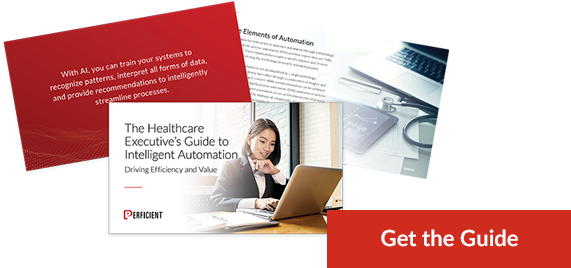Enterprises often take an approach to automation focusing solely on technology, such as robotic process automation (RPA), and may claim to be “fully automated.” However, these organizations may be using the technology in ways beyond its intended purpose.
Intelligent automation is not achieved by one technology working in isolation, but rather through a combination of insights and technologies working together. While traditional digital process automation (DPA) or process orchestration can achieve partial automation, true intelligent automation lies at the intersection of process mining, DPA, RPA, and AI. Without all these components, processes may not be fully optimized or achieve maximum automation efficiencies.
What Is Robotic Process Automation (RPA)?
RPA utilizes software with AI and ML capabilities to handle repetitive tasks that were previously done by humans.
RPA is driven by five core tenets for human-system interactions:
- Optical character recognition (OCR)
- Legacy application integration
- Web scraping
- Desktop recording
- API connectors
These tenets provide robotic solutions for daily repetitive tasks. Integrating legacy applications with RPA can bring cost savings and faster time to market for organizations.
Although healthcare organizations see the potential of RPA, many struggle to scale programs beyond pilot projects internally. This has led to an increasing number of healthcare leaders partnering with intelligent automation experts like Perficient, who also possess deep healthcare expertise.
4 Use Cases for RPA in Healthcare
- Optimize the digital data landscape: RPA can ensure accurate migration of patient data across multiple systems and maintain up-to-date records.
- Streamline the revenue cycle (U.S. providers): RPA can minimize risks in claims management by improving data management and ensuring accurate account updates.
- Improve decision-making with accurate utilization management: Intelligent automation can enhance the speed and accuracy of case assessment and decision-making for better healthcare cost management.
- Streamline patient screening and diagnostics for improved outcomes: RPA can increase accuracy and efficiency in hospital test facilities to enhance patient outcomes.
Our new guide The Healthcare Executive’s Guide to Intelligent Automation delves into various topics, including:
- How RPA intersects with other automation and intelligence technologies
- How automation drives efficiency and value in healthcare
- Key automation trends and drivers of adoption
- Core elements of a successful automation strategy
- Best practices and steps to get started
Why Perficient
At Perficient, we combine healthcare and automation expertise to help you build stronger teams and establish optimal processes. Our experts can analyze your current work processes and help optimize them for the future.
We partner with organizations that offer best-in-class products addressing the key elements of intelligent automation. We provide readiness evaluations, business case development, implementation and migration services, and rapid development and pilots to meet your unique needs. Perficient has been recognized as a key healthcare consulting leader by Modern Healthcare and cited as a “Contender” in The Forrester Wave™: Digital Process Automation Service Providers, Q3 2020 report.




